Laura Ashley 30 years on: Memories of the girl from Dowlais
- Published
The fashion label was famous for its romantic silhouettes and nostalgic frills
For more than half a century her name has been synonymous with quintessential English style but Laura Ashley was Welsh through and through.
She rose from humble beginnings in a colliery worker's cottage in Dowlais, Merthyr Tydfil to become the owner of a multi-million pound fashion and furnishings empire, with 500 shops worldwide carrying her name.
Wales played a huge part in her success: her first shop opened in Machynlleth in 1961, with a factory following two years later in Carno, Powys.
Here, to mark this month's 30th anniversary of her death, her family and the people who worked with her in mid Wales, or "Laura-Land" as her children call it, share their memories of a radical, determined woman who knew exactly what she wanted and exactly how to get it.
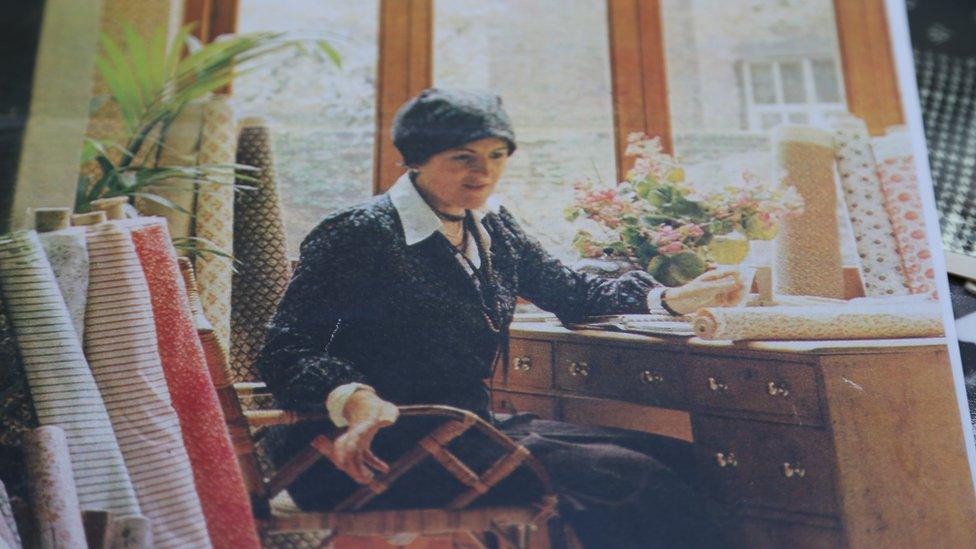
Laura Ashley: the trailblazing businesswoman who hated being called a feminist
In 1953, in a basement flat in London's Pimlico, Laura Ashley and her husband Bernard laid the foundations for what would become one of Britain's greatest fashion success stories.
Inspired by an exhibition of patchwork and quilts at the Victoria and Albert Museum, Laura used library books to teach herself how to transfer colour onto fabric, working on a silk screen built by Bernard in their kitchen.
An initial order of 20 scarves from John Lewis grew and they began printing tea towels, gardening aprons and smocks. Bernard left his job in the City to join the family business full-time.
But it was by no means an overnight success. The couple struggled to raise working capital and every penny of profits had to be reinvested into materials.
By 1961, they were living in a cramped cottage in Kent, with three children under the age of six and their marriage was in trouble.
Laura had a rather drastic solution to the family's problems. She packed some tents, bedding and her children into a car and headed for mid Wales, where they set up camp on the banks of Mawddach Estuary near Dolgellau. Bernard followed three weeks later and the family lived like this for six months.
Their eldest son David, now 60, recalls: "My home life, to us, was quite normal growing up, but looking back on it now and having children of my own, I suppose it was quite radical.
"There was one tent for the children, another tent for my parents and a middle tent which was the family tent. My father, of course, couldn't come there all the time. He had to run the showroom in London. He used to come back at weekends. People would come up to us and ask, 'Are your parents married?' They used to think my father was having an affair on the cheap."
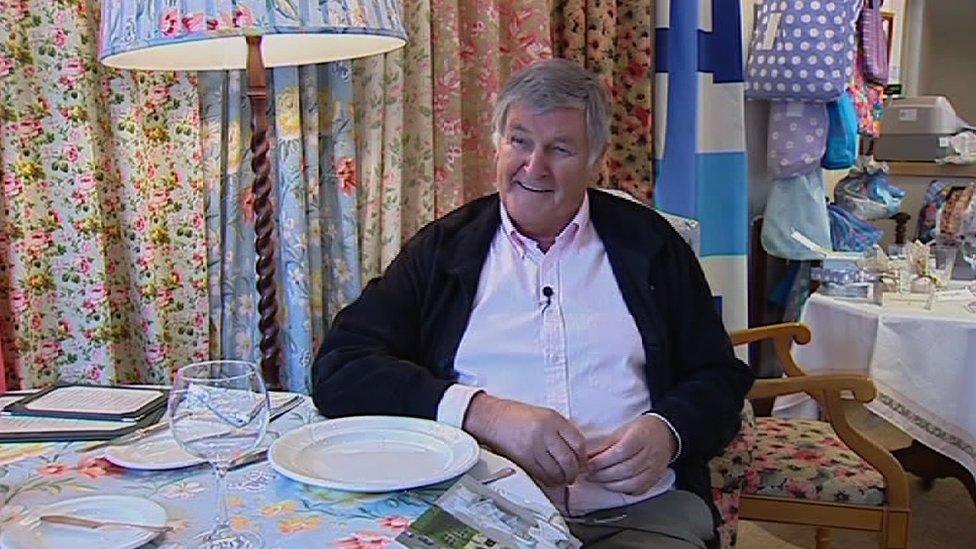
Bernard Ashley had a 'fantastic' relationship with his wife and business partner Laura
Quiet but determined
According to David, his parents enjoyed a "fantastic relationship". Laura had a calming influence on Bernard's "very angry" temper but make no mistake, it was she who called the shots.
"If my father had not had my mother, I don't know what would have happened to him," he admitted. "He would have been an absolute bloody wreck. My mother could never be described as gregarious. She was quiet and I suppose you could use the word manipulative, but persuasive I think is a better word."
One incident in particular, when the family had moved to a run-down farmhouse at Clogau, near Caersws, stands out in David's mind.
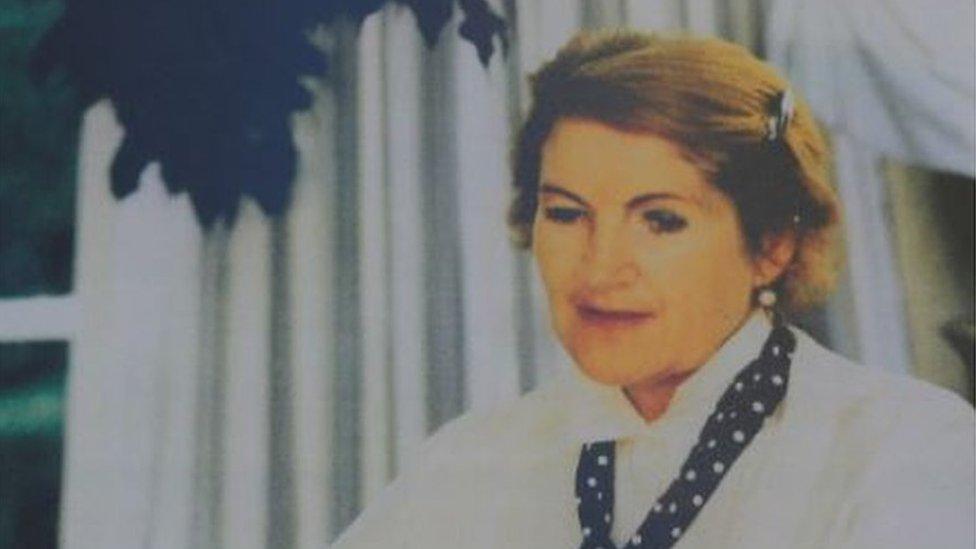
"Quiet but persuasive" Laura knew exactly how to handle her sometimes "very angry" husband
His father loathed trade unionist Arthur Scargill. One night David and his three siblings were woken by a loud bang and ran into the sitting room.
"The television had been destroyed and my father was standing there with a smoking shotgun. He said, 'Got him!' He'd shot Arthur Scargill on the television. My mother was standing there just giggling. That actually sums them up."
But David also witnessed tender moments between his parents.
"My father loved music. Often we'd come into the sitting room and my mother and father would be there dancing quietly to Frank Sinatra. It was deeply romantic. They had all these stresses running this business. All they'd talk about was business, business, business. At some point they must have stopped talking about business and started talking about life in general.
"My parents were very much in love with each other. She could always get what she wanted very quietly. She always said, 'You can never push your father, you have to pull him'."
Over the next 20 years, the same quietly determined streak which underpinned Laura's marriage helped propel the family business into an astonishing international success.
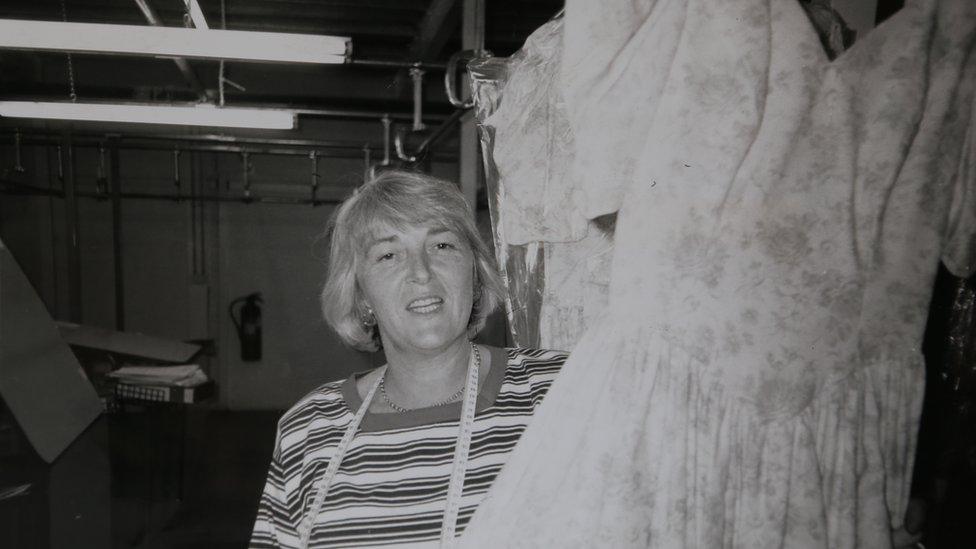
Rosina Corfield at work in the Laura Ashley factory
Their first shop was opened in 1961 at 35 Maengwyn Street, Machynlleth.
Rosina Corfield, now 70, retired and living in Newtown, Powys was the couple's first employee in Wales. She remembers meeting Laura, who was "always smiling, never miserable" more than 50 years ago.
"They were different to other people around Machynlleth", she said, "A bit way-out to what we were used to, like hippies. She had the blouses with stand-up collars and big brooches and beads. They would stick out walking down the street."
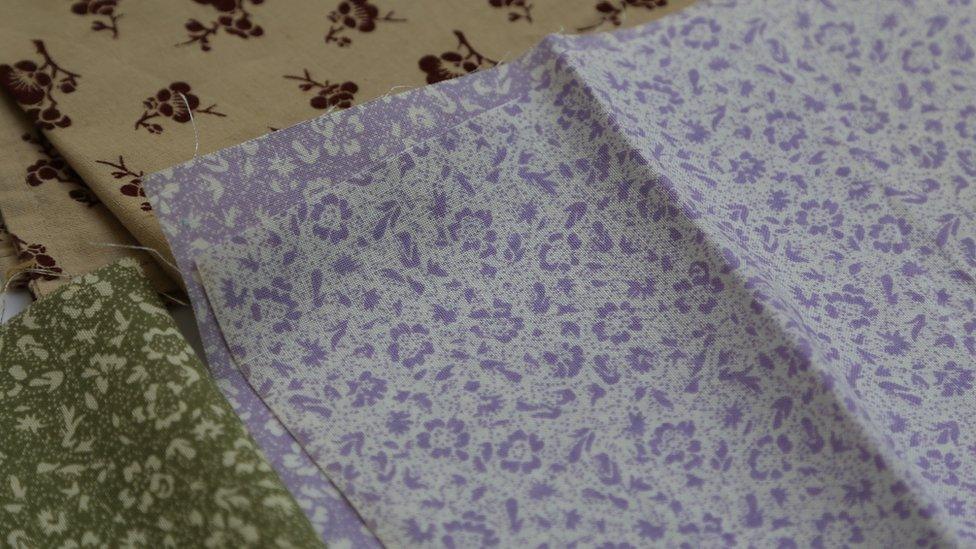
Laura Ashley's floral prints became favourites the world over
Rosina was amused by the Ashleys' sophisticated London ways: "What makes me laugh, when I went to Machynlleth and had lunch with them they had wine. We didn't know what wine was then. And they were having celery and raw carrots. I can remember going home to my dad and saying, 'God, they're funny people, they're giving me raw vegetables to eat!' Well, we're all doing it now aren't we?"
Brian Jones was a 23-year-old shop worker and keen painter when he first met Laura in 1972, the year in which the company opened its first international shop, in Geneva, Switzerland.
Brian, now 67, remembers how his father, unbeknown to him, applied for a job as a designer at the company's offices in Carno on his behalf.
"This letter came from Carno asking me to bring my portfolio. Portfolio? What's a portfolio? I just went and took some pictures off the wall."
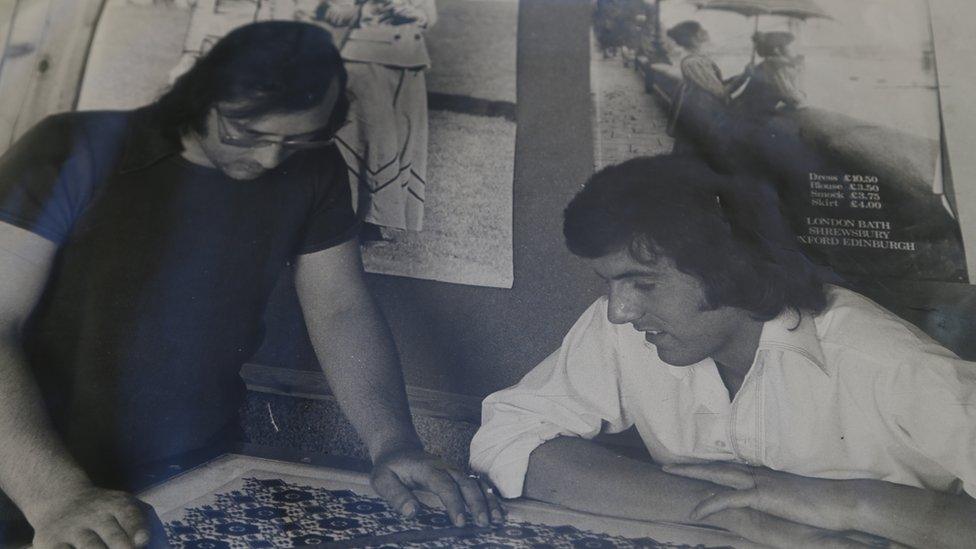
Rookie designer Brian Jones (right) at work in Carno
Despite his inexperience, or perhaps because of it, he got the job.
"Years later I met up with Laura's daughter Jane and I said to her: 'Your mother could have had the pick of designers anywhere in the world. Why did she pick a little young lad from Newtown who was working in a shop with no design experience?' And she said she picked me because she wanted a blank canvas.
"She was looking for somebody who could adapt her ideas into print. She knew what she wanted. It was all from her. It was her ideas, her company.
"It was amazing to be in the heart of this thing that was happening, the Laura Ashley explosion."
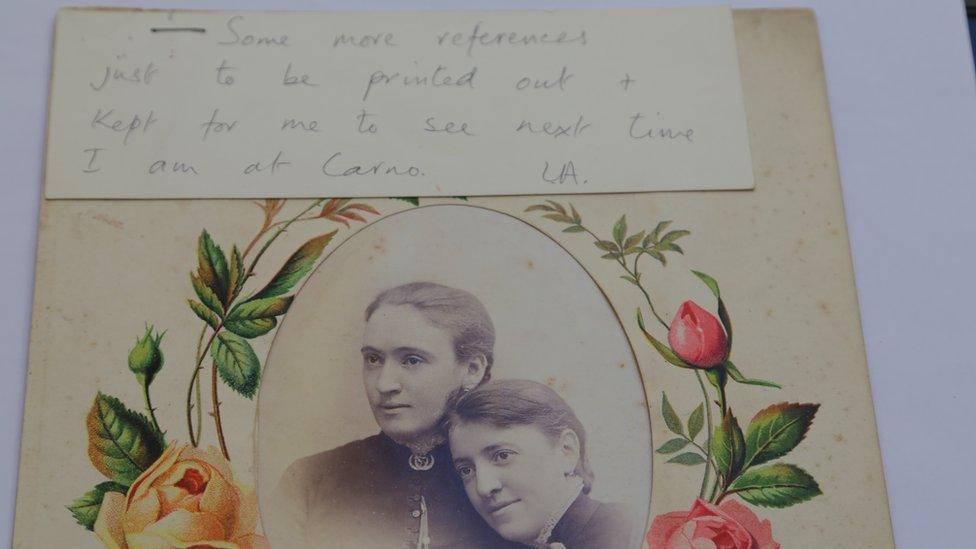
Laura would leave Brian Jones hand-written notes outlining what she wanted, signing them 'LA'
Family first
The 1970s were halcyon days for Laura Ashley as the world became hooked on the label's romantic silhouettes, nostalgic frills and floral prints. In one week alone, London's Fulham Road shop sold 4,000 dresses.
Towards the end of the decade the company launched its first home furnishing range. By 1981, the Ashleys had 500 shops all over the world. New factories in Newtown, Powys and Gresford near Wrexham followed, creating hundreds of jobs for Welsh workers.
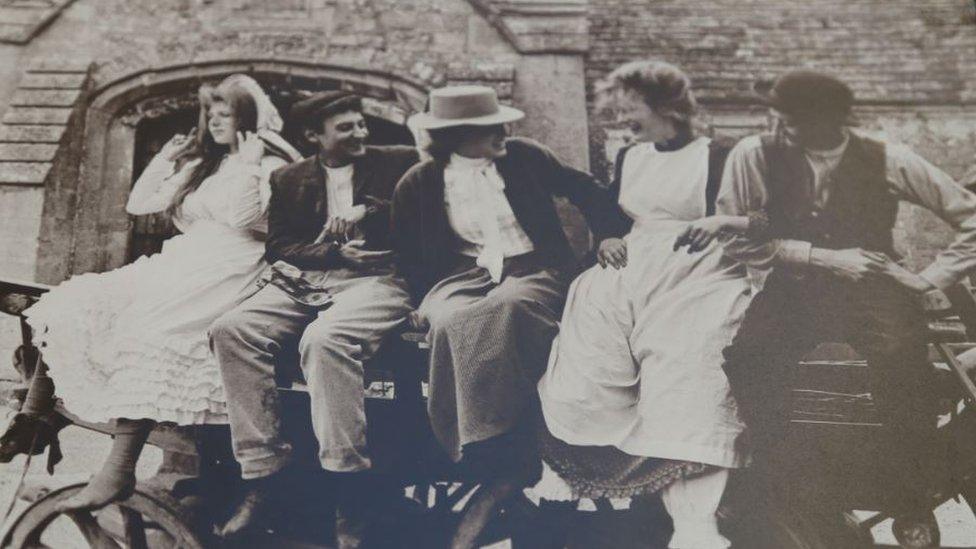
The label was famous for its romantic silhouettes and nostalgic frills
As the business grew, so did the family's fortunes. They had homes in London, Belgium, France and the Bahamas as well as a private plane and a sumptuous yacht. But Laura always kept her feet on the ground.
"Coming from a very strong south Wales Baptist family, my mother's life was definitely dictated by her Christian values from a very early age," said David Ashley. "It was a sense of fairness."
Brian Jones agrees: "I think we all loved her. She was just Mrs Ashley. She was so ordinary and yet she was special.
"She had a very thin wedding band on her finger and she wore the same white blouse, cardigan and skirt. Sometimes she'd have a hole in her sleeve, it didn't matter."
"We loved going to work. We were happy in our work," said Rosina Corfield. "Laura believed in family. If there was something wrong with the family, the family came first."
When Rosina was raising her children, fabric would be delivered to her house so she would sew while caring for her family. "We wouldn't be living in this house if it wasn't for them", she said of the Ashleys.
David remembers his mother caring deeply about her staff: "She was 100% into workers' rights. My mother's politics stemmed from her attitude as a manager of a business and that the chain is only as strong as the weakest link. So the weakest link is the person you have to take care of the most."
Formidable streak
At 21, David left for the United States to open up new Laura Ashley shops, a move he believes was orchestrated by his mother to diffuse the difficult relationship he was having with his father at the time.
He eventually led the company's expansion programme and took great pride placing a placard in new shop windows that read: 'London, Paris, Llanidloes'.
It was at a TV studio in America that his mother showed her "quite formidable" streak. David remembers a journalist starting a question with, "Well Laura, seeing as you are such a strong feminist…"
"My mother said, 'I beg your pardon?' And the woman said, 'What? You are a feminist, aren't you?' And she said, 'Certainly not'. She looked at the woman and said, 'The trouble with feminists is that they put themselves on an equal with men. Well I'm a woman and I'm much stronger than any man.' And she meant it."
"In particular, she hated Margaret Thatcher", chuckled David. "She would describe her as 'that bloody woman' and she hardly ever used that word. She would say, 'She's carrying on like a man in Parliament, shouting and screaming and ranting. A women should never shout like that. A women should never have to resort to sounding like a man'."
'Shocking' death
David was in America when he learnt of his mother's accident, in an early morning phone call from his aunt. But he did not realise the gravity of the situation until his father called him half-an-hour later.
"He said, 'David, you'd better get on a plane. It's serious.' I'd never heard my father's tone of voice like that before, ever."
Laura had fallen down the stairs in her daughter Jane's Cotswolds home. It was just ten days after her 60th birthday.
When he saw his mother in a coma, David knew he had lost her.
"It was obvious to me at that point that my mother had passed. She was being kept alive on a machine which was very cruel. We had 10 days of my mother being in a coma and the English press were absolutely horrifically awful.
"Every time we were together as a family there were photographers around us. To this day when I think of certain newspapers, all I can think of is absolute anger at how they treated the family."
David lost not just his mother but his business mentor: "I was a 30-year-old man in the prime of my profession in America. I really needed my mother. There was a lot of emotion and love attached to me doing this job with her. So losing her like that was quite a shock."
Brian Jones recalls the news of her fall reaching the office: "We couldn't believe it. We were all in shock. Everybody was numb. Everybody loved Laura Ashley. I don't think things were ever the same again. The life had gone out of the company."
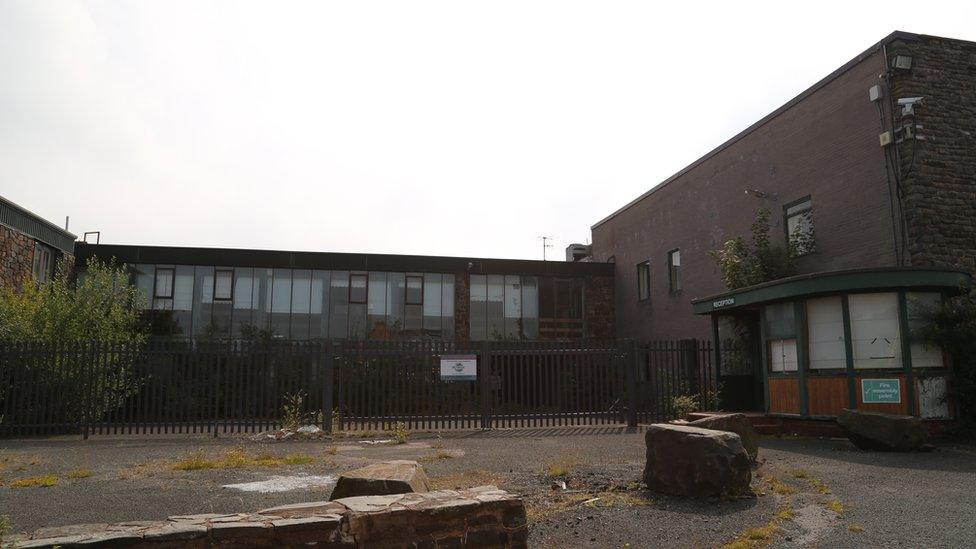
The Laura Ashley factory in Carno closed in 2005
Lasting legacy
Much has changed in the 30 years since Laura's death.
Two months after she died, the business was floated on the stock market with a valuation of £200m. Its shares were 34 times oversubscribed.
But in the ensuing years, Laura Ashley lost its way. Power-dressing was in, romantic garb was out and the company failed to move with the times. It went through 10 CEOs in 13 years but still the downward spiral continued.
In 2004 the company announced it was making 130 redundancies, 90 in Carno and Newtown.
The following year, the Carno factory closed with staff relocated to Newtown. Laura, who loved the village and is buried in its small churchyard, would have doubtless been devastated.
David said: "My mother always said a manufacturing company can last forever, a retail company can only last for five years. She knew Laura Ashley the retail company wouldn't be around forever.
"It's a totally different company; it's just got my mother's name on it. I walk through the shops and they're not the same shops at all."
But the spirit of this talented and determined woman lives on in the Ashley Family Foundation, which supports projects to strengthen rural communities in Wales.
David explains: "If you have an idea for a hair-brained anything product the Foundation will fund it. If it had have existed when we were living in a tent in Dolgellau, that's where my parents would have gone."
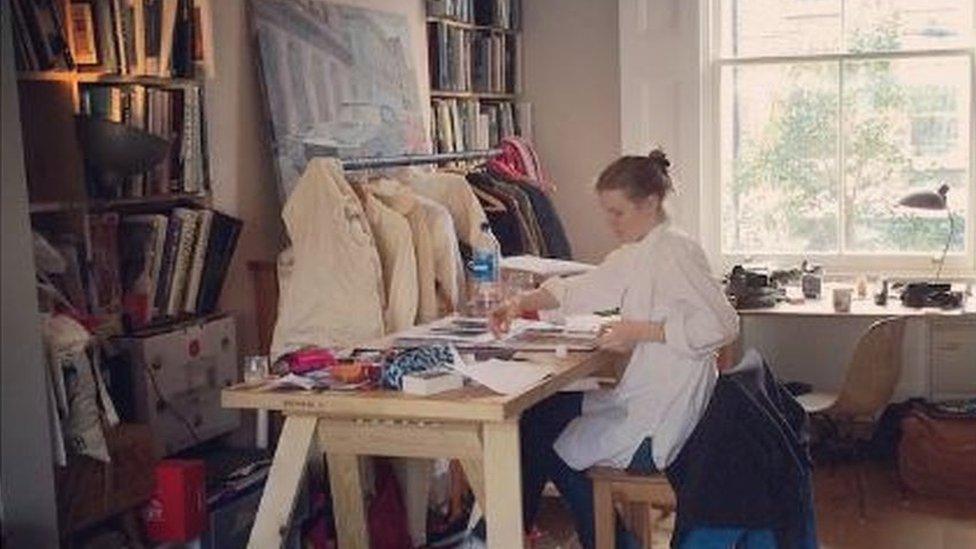
Edie Ashley has followed in her grandmother's footsteps and is studying fashion
Laura would now be a grandmother of ten. "She loved being a grandmother," said David. "One of the biggest regrets of my life is that she didn't know all 10 grandchildren. Every single one of them is an absolute gem."
Edie, daughter of Nick, the Ashleys' third child, is now 19 and studying fashion at Kingston School of Art. She has grown up hearing about her grandmother: a "kind, really caring, lovely woman with this hard as nails personality."
"It's crazy the relationship I have with her in my mind," she said. "She's a huge part of my family. Although I've never even met her I feel so connected to her. She is so talked about the whole time."
Just like her grandmother, Edie takes her design inspiration from old artefacts. Where Laura spent her time in antique shops in Wales, Edie spends most Fridays wandering around Portobello Road, London looking at "crazy one-off pieces."
"Dad speaks about her like his hero which is so nice. He always says, 'You would get on with her so well. She would absolutely love you'."
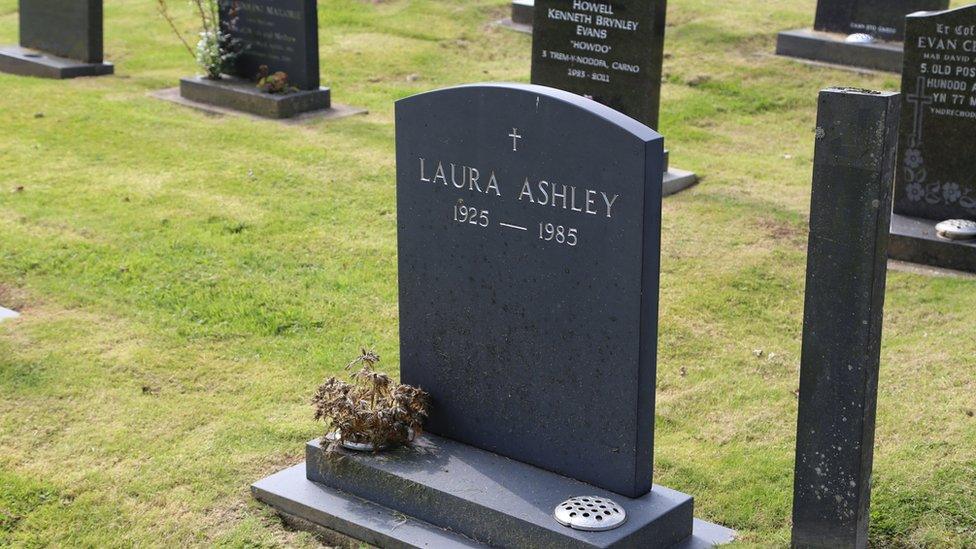
Laura Ashley is buried in the small churchyard in Carno, Powys
But what would Laura make of what is now happening to the firm that still bears her name?
Under the ownership of Malaysian conglomerate MUI Group, the company has increasingly turned away from fashion to concentrate on its home furnishings range. The strategy has worked: in 2014 its pre-tax profits rose by almost 15 per cent. Laura Ashley, it appears, is back.
And, despite factory closures and bruising job losses over the years, its Welsh base has survived - 200 people are still employed at its Newtown factory, producing paint, wallpaper and made to measure curtains.
Beneath those delicate floral prints is a true fighter of a brand - just like its quiet but determined founder.